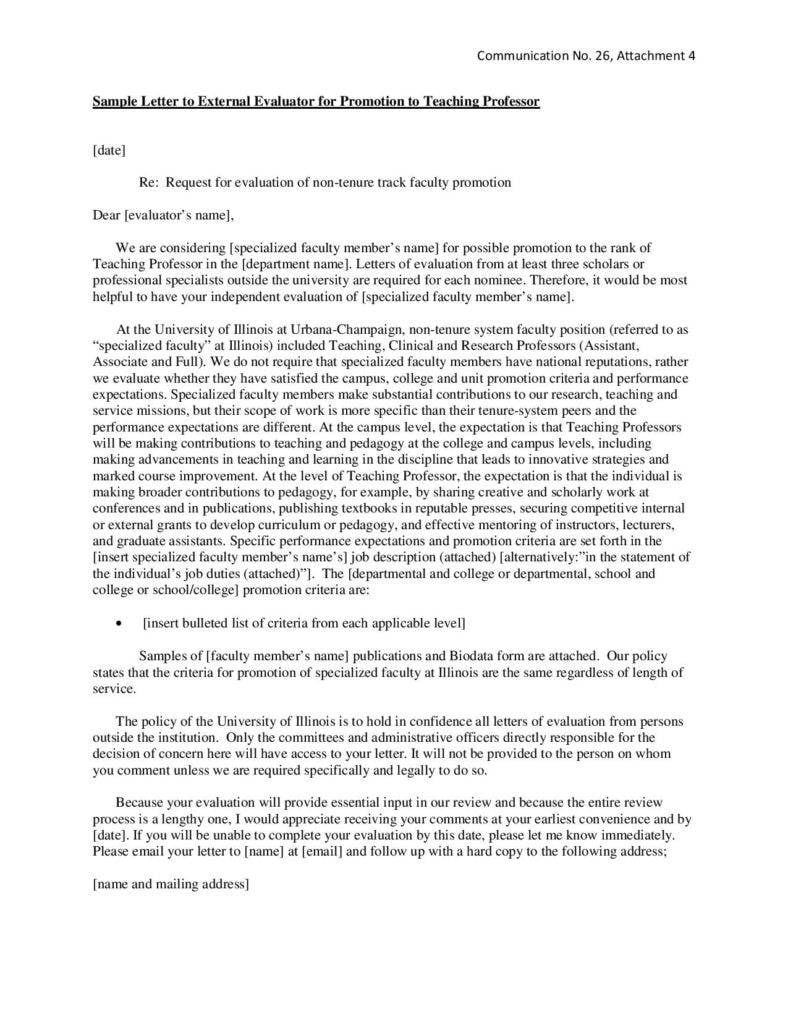
- #Examples of tenure dossier review letters how to#
- #Examples of tenure dossier review letters full#
- #Examples of tenure dossier review letters professional#
The department should engage voting faculty with knowledge of the candidate’s discipline in compiling their list.
#Examples of tenure dossier review letters professional#
The lists should be comparable in length and assembled with one goal in mind: The potential reviewers should be able to provide a fair and objective assessment of the candidate’s professional accomplishments. The proposed independent list method is as follows: The candidate and department independently produce a list of reviewers. Collectively, the external reviewer letters should inform the reader about the breadth, depth, impact, and trajectory of the candidate’s professional accomplishments.īecause of the importance of this dossier component, both the candidate and department should be able to suggest reviewers. The purpose of an external reviewer is to provide an outside perception of the candidate’s research and scholarship. Note that by this definition, an external reviewer can be a Cornell faculty member, e.g., a member of the candidate’s graduate field who is in a different department.

What the colleges have to say about external letters and reviewers,Īn external reviewer is an individual who provides an evaluation of the candidate’s scholarship and is not a voting member of the candidate’s unit. Sponsor: Academic Freedom and Professional Status of the Faculty Committee Posted: Febru(AFPSF edited version posted November 5, 2021)

Policies and Assistance Toggle the sub-menu Retirement and Becoming Emeritus/a Toggle the sub-menu
#Examples of tenure dossier review letters full#
The full Chronicle of Higher Education article is available here: Ĭontent originally published on. The article goes on to say that, although external reviewers’ recommendation letters are supposed to be confidential, writers should assume the tenure candidate will see the letter or be briefed on its contents, and should endeavor to write in a way that is balanced and objective. I have witnessed several instances in which a letter-writer wrote ‘X is a spectacularly outstanding pioneering genius superstar just like Z at Other Great University and I therefore support X 100 percent for tenure at Your University,’ only to hear a committee member say, ‘But I think Z is mediocre.’” “It is nearly impossible to do that in a fair way. “The biggest potential minefield in terms of sending a message you don’t intend is if you try to compare the candidate to his or her so-called peers,” the article says.
#Examples of tenure dossier review letters how to#
The article goes on to answer questions about the appropriate length of recommendation letters the most important content to include whether evaluation committees “read between the lines” of reviewer comments and how to avoid sending unintended messages.

And that culture can change over time depending on the people involved in the tenure-and-promotion process at various administrative levels.” It’s not - mostly because the answer depends on the culture of the institution or department. “Who gets asked to write external letters?” the article asks. The article deals with a range of questions, from basics of “who” and “why” to more detailed “do’s” and “don’ts.” To help external reviewers get a handle on the art and science of these situations, The Chronicle of Higher Education in September published “To Tenure or Not To Tenure,” written anonymously by a professor at a major research university, which serves as a guide for writing external recommendation letters. The work and expectations involved in writing an outside recommendation letter can vary greatly, and the information needed from the external reviewer is not always spelled out by the institution or committee requesting the recommendation. In order to compile a robust and objective profile of the candidate, many universities solicit recommendation letters from academics within the same discipline from other institutions. Whether or not to award tenure to a faculty member is an important question that requires detailed analysis by the candidate’s peers and superiors.


 0 kommentar(er)
0 kommentar(er)
